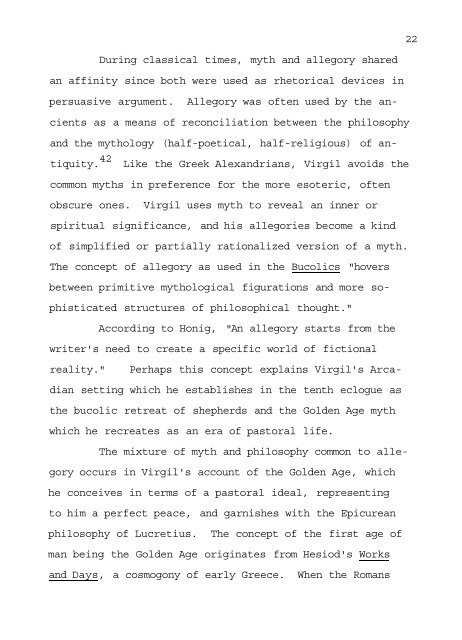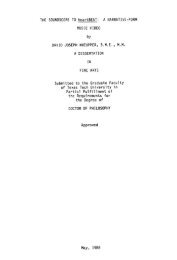THE EVOLUTION OF ALLEGORY IN THE PASTORAL ... - Repositories
THE EVOLUTION OF ALLEGORY IN THE PASTORAL ... - Repositories
THE EVOLUTION OF ALLEGORY IN THE PASTORAL ... - Repositories
Create successful ePaper yourself
Turn your PDF publications into a flip-book with our unique Google optimized e-Paper software.
22<br />
During classical times, myth and allegory shared<br />
an affinity since both were used as rhetorical devices in<br />
persuasive argument.<br />
Allegory was often used by the ancients<br />
as a means of reconciliation between the philosophy<br />
and the mythology (half-poetical, half-religious) of antiquity.<br />
42<br />
Like the Greek Alexandrians, Virgil avoids the<br />
common myths in preference for the more esoteric, often<br />
obscure ones.<br />
Virgil uses myth to reveal an inner or<br />
spiritual significance, and his allegories become a kind<br />
of simplified or partially rationalized version of a myth.<br />
The concept of allegory as used in the Bucolics "hovers<br />
between primitive mythological figurations and more sophisticated<br />
structures of philosophical thought."<br />
According to Honig, "An allegory starts from the<br />
writer's need to create a specific world of fictional<br />
reality."<br />
Perhaps this concept explains Virgil's Arcadian<br />
setting which he establishes in the tenth eclogue as<br />
the bucolic retreat of shepherds and the Golden Age myth<br />
which he recreates as an era of pastoral life.<br />
The mixture of myth and philosophy common to allegory<br />
occurs in Virgil's account of the Golden Age, which<br />
he conceives in terms of a pastoral ideal, representing<br />
to him a perfect peace, and garnishes with the Epicurean<br />
philosophy of Lucretius.<br />
The concept of the first age of<br />
man being the Golden Age originates from Hesiod's Works<br />
and Days, a cosmogony of early Greece.<br />
When the Romans
















